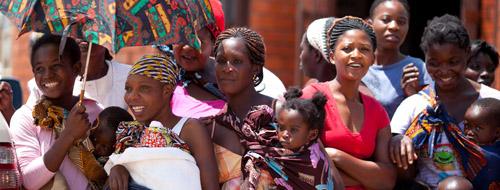
Mothers wait with their children to greet President and Mrs. Bush at the George Urbin Health Center in Lusaka, Zambia. (Courtesy of Pink Ribbon Red Ribbon)
Dr. Doyin Oluwole experienced the miracle of life as a young girl in Nigeria. Her mother was trained as a midwife by an American missionary and worked at a private facility behind her home, where she took care of children and delivered babies in a small clinic.
Oluwole would often allow her daughter to stay in the room with her and see the babies being delivered.
“That grew my interest in medicine,” Oluwole said. “To see a woman in labor screaming, and to see that little life pop out. The joy of seeing that woman deliver the baby.” Oluwole wasted no time pursuing her own medical career.
She wanted nothing more than to follow in her mother’s footsteps so she decided to become a pediatrician.
Earning a medical degree with honors from the University of Lagos and a membership of the Royal College of Physicians from the University of Edinburgh, Oluwole went on to pursue her career in medicine as the head of pediatrics at a medical school in Nigeria.
Through her work, she began to witness a trend in the children she treated.
“Out of my clinical research I found that a lot of children were coming in sick and were terminally ill,” she said.
Determined to discover what was responsible for this trend, Oluwole decided to do some investigating.
“I went right out there to the community to see what was going on – with mothers, with the environment and with these children,” she said.
“I found that mothers were ignorant, they were not there, they were illiterate or they were sick. As time went on, I thought that thoroughly addressing the women and focusing on these women and making sure that the mother is well, is healthy and is alive would be the best way to ensure a survivor of a child.”
Oluwole continued her mission at the World Health Organization in 1995 where she was made the director of the child survivor program in the African region for ten years.
During her time with the organization, Oluwole refocused her research on women’s health.
She explored women during each stage of pregnancy, labor and delivery to try to understand the root of the problem that she was witnessing in these sick children. In 2006, Oluwole received a call from Washington D.C. asking her to lead the health program at Family Health International (now known as FHI360) as director of the Center for Health Policy and Capacity Development. She thought this position would provide an excellent opportunity to further advance her research, so she accepted and worked for the non-profit organization for six years.
This decision eventually led Oluwole to be given a position at the George W. Bush Institute to head the Pink Ribbon Red Ribbon (PRRR) initiative addressing women’s cancers in Africa and Latin America.
After researching the work of President Bush and his team at the institute with HIV, AIDS, and malaria in Africa, Dr. Oluwole recognized how addressing the spread of HIV in Africa could improve children’s lives.
She said, “I thought if I can help reverse that trend, it would be great. So that’s why I took this job.”
Pink Ribbon Red Ribbon works in conjunction with PEPFAR (the President’s Emergency Plan for AIDS Relief) to screen women for cervical cancer, because women who have HIV are four to five times more likely to contract cervical cancer.
The Pink Ribbon Red Ribbon initiative was created in September of 2011, joining PEPFAR, the George W. Bush Institute, the U.S. Department of State, Susan G. Komen for the Cure and the Joint United Nations Programme on HIV/AIDS. Its mission is to use government and private money to combat cervical and breast cancer, which are two of the leading causes of cancer death in women, in developing nations in Sub-Saharan Africa and Latin America.
“I was never initially focused on cervical and breast cancer but I am now. And I see that it is a good thing to do because HIV positive women are now surviving from HIV infection,” Oluwole said.
Oluwole became executive director of Pink Ribbon Red Ribbon on February 14, 2012. Oluwole works with the PRRR partners and manages staff members to ensure efficiency and coordination.
Oluwole’s main goals with the organization include expanding the availability of cervical cancer screening and treatment, particularly for high-risk HIV-positive women, as well as promoting breast cancer education.
Long term, the organization hopes to reduce deaths from cervical cancer by an estimated 25% among women screened and treated through the initiative, to increase access to breast and cervical cancer prevention, screening and treatment, and to create innovative models that can be scaled up and used globally.
Next up for Oluwole: She is planning a global cancer summit in Africa this summer with President Bush and the former first lady to advance the goals and efforts of the Pink Ribbon Red Ribbon initiative.
With four grown children pursuing degrees and careers in various states across the country, Oluwole continues to focus her efforts on the children who need her the most.









